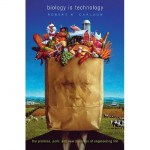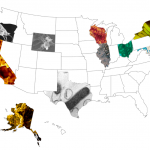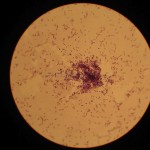Policy
One more day to vote in the , which asks the question "Is Biotechnology compatible with sustainable agriculture?"
PZ Myers answers the question this way: "this is weird: agriculture is biotechnology, and just breaking ground with a sharp stick and throwing some seeds in is an example of an 'unnatural' human practice"
He also publishes the opposition's "top secret email", which has some gobbledy-gook about how farmers are turning against GE crops (um, name one?) and contaminating nature (massive reductions in insecticide use on BT cotton fields and enhanced biodiversity is destruction?). PZ…
The New York Times has an article about the opening of a teacher-run school in The City. It sounds like an interesting experiment:
Shortly after landing at Malcolm X Shabazz High School as a Teach for America recruit, Dominique D. Lee grew disgusted with a system that produced ninth graders who could not name the seven continents or the governor of their state. He started wondering: What if I were in charge?
Three years later, Mr. Lee, at just 25, is getting a chance to find out. Today, Mr. Lee and five other teachers -- all veterans of Teach for America, a corps of college graduates who…
Earlier this week, there was some interesting discussion of science communication in the UK branch of the science blogosphere. I found it via Alun Salt's "Moving beyond the 'One-dinosaur-fits-all' model of science communication" which is too good a phrase not to quote, and he spun off two posts from Alice Bell, at the Guardian blog and her own blog, and the proximate cause of all this is a dopey remark by a UK government official that has come in for some justifiable mockery.
Bell and Salt both focus on the narrowness of the "dinosaurs and space" approach-- a reasonably representative quote…
The kerfuffle of the moment in the science blogosphere once again relates to Chris Mooney, who is pretty much a kerfuffle looking for a place to happen at this point. This time around it centers around a Washington Post op-ed that is basically the executive summary of a American Academy of Arts and Sciences paper that is itself the executive summary version of a series of four workshops on science and the public. You can get a reasonable sense of the kerfuffle from the links in Chris's responses to the responses.
I'm currently making one of my intermittent attempts to be a better person--…
In a recent conversation about the safety and ethics of synthetic biology in the wake of the announcement of the synthetic genome, many of the professors I was chatting with commented on how they hoped new synthetic biology technology would lead to bacteria that could eat the oil spilling into the gulf of mexico even as I type this right now. Of course, the "technology" for oil eating bacteria already exists and have already been used for clean up in previous oil spills--many naturally occurring species of bacteria can already break down the hydrocarbons in crude oil. The natural oil eaters…
Biosafety has been on everyone's mind this week after the announcement of the J. Craig Venter Institute's successful transplantation of a synthetic genome. What horrible pathogen will future bioengineers be able to design? What unforeseeable environmental catastrophe will befall us upon the release of genetically engineered bacteria? These are hugely important questions as research in synthetic biology moves forward, being discussed in congressional hearings and as an integral part of every new synthetic biology design.
As the major proposed goal of a great deal of synthetic biology research…
Student guest post by Francis Mawanda.
HIV/AIDS is a major public health problem worldwide. To date, it is estimated that more than 60 million people have been infected with HIV and more than 25 million people have died as a result of HIV/AIDS worldwide1. Despite the high prevalence and mortality rates that are associated with HIV/AIDS, and after more than 29 years of aggressive research efforts, there is still no cure or vaccine to prevent against HIV/AIDS. And although the introduction of antiretroviral (ARV) drugs in the mid 1990s greatly improved the outlook, health and quality of life…
[This post comes courtesy of the State Department's Katherine Musgrove, who is an economic officer in the Office of Economic Policy and Summit Coordination in the Bureau of Western Hemisphere Affairs. The Energy and Climate Partnership of the Americas is having its first ministerial right now in Washington D.C., and you can watch the end of it here
Katherine is ready to field any questions you have about the ECPA and the Ministerial, so ask away in comments.]
In the Western Hemisphere Affairs bureau at the U.S. Department of State, we have been working to advance policies and programs to…
Last week's issue of Nature focused on the progress (or lack thereof) in genomics and related fields since the Human Genome Project (HGP) was completed ten years ago. In many ways, the era of genomics has yet to fulfill many of the promises made twenty years ago, but the investment in science and technology has at the same time made a valuable impact on many fields in basic science. Understanding this recent history of the genomics bubble is crucial to how we approach current science and technology investments in areas such as personal genomics and importantly, synthetic biology.
In a…
The fight over genetically modified foods, whether they're safe, healthy, good for the environment, or just plain "unnatural," has been going on for a long time now. Most people in the scientific community agree that genetic modification in general is a good thing, able to create crops that need less water, less fertilizer, less pesticide, or that contain extra vitamins and nutrients that are otherwise difficult to come by in certain parts of the world. Many would also argue that fighting against such life-saving, often environmentally sustainable modifications is a sign of an ignorant anti-…
John Broder writes today in the New York Times that the uproar over the unauthorized release of hundreds of emails and recent revelations about a mistake in the IPCC report threatens to undermine decades of work and has badly damaged public trust in the scientific enterprise.
Broder's interviews with scientists reveal two thoughtful but seemingly opposing viewpoints:
'Ralph J. Cicerone, president of the National Academy of Sciences, the most prestigious scientific body in the United States, said that there was a danger that the distrust of climate science could mushroom into doubts about…
Eggplants are found in many colors: green, white, purple, yellow, even striped. They are shaped like cucumbers or apples. They are eaten in Italy as melanzane alla parmigiana, in France as ratatouille, and in the Middle East as baba ghanoush.
My husband Raoul usually grows Imperial Black Beauty, Rosa Bianca, and the hybrids Beatrice and Nadia. We cook them shortly after harvest:
Spicy Eggplant
2 Eggplants, diced into 1/2" cubes
3 tbsp Olive oil
1 Clove of garlic, smashed and chopped
1/2 tsp Chile flakes
1. Sauté smashed and chopped clove of garlic in the olive oil.
2. Add the chile flakes…
"The history of any given technology is extraordinarily complex."
--Rob Carlson, Biology is Technology.
Analyzing the history of a technology requires a complex look at the social, economic, and political context in which it emerged, and the reciprocal influences that the developing technology exerts on these factors. Predicting what the future of a technology will be like, how it will affect the economy and understanding the potential risks and payoffs is much much harder. Rob Carlson's new book, Biology is Technology: The Promise, Peril, and New Business of…
Hunkered down in an elegant hotel in Washington DC, watching the epic storm continue unabated, I cannot help but think of award winning author Kim Stanley Robinson's "Fifty Degrees Below", the second novel in his three-part trilogy.
In this book, Washingtonians experience the most intense winter on record. As rigid temperatures shut down the city, the main character, Frank, is living in a treehouse in Rock Creek Park and heroic women scientists (I especially like that part) are trying to force the self-absorbed politicians to put in place effective policies to avert a global catastrophe. It…
Synthetic biology is still a new field, and victories are small and incremental. Much of the promise and peril of synthetic biology still lies in the future: genetic devices made to order, computer aided genome design, organisms specially constructed for specific industrial purposes. Will we use this biological technology for good--new more affordable and accessible drugs, better vaccines to emerging diseases, and clean energy--or evil--new deadly pathogens and immortal super soldiers? I think it's safe to say that almost everyone hopes that we'll get all of the good stuff without any of the…
I've had some great suggestions for "Official" State Microbes in comments and via twitter. I'm filling in the map as they come:
So far we have:
Alaska -- Alcanivorax borkumensis for its oil consumption
California -- Ralstonia metallidurans for its gold precipitating qualities (and CA-MRSA as a terrifying runner up)
Illinois -- Penicillium roqueforti for its blue cheese making
Maryland -- Chlamydia trachomatis for UMD research on the bug
Massachusetts -- Escherichia coli for its importance to biotech
New York -- Pseudomonas putida, the first organism to be the subject of a patent case, which…
Wisconsin lawmakers just passed a bill to name Lactobacillus lactis, the bacteria that turns milk into cheese, into its official state microbe! What microbe do you think best represents your state? I think Massachusetts' state microbe should be E. coli, not for the gross make you sick part of course, but because of the importance of the biotech industry to Massachusetts and the importance of the lowly E. coli to biotech. Add your vote for your state microbe in the comments!
Read Emily Waltz' interview with Roger Beachy, the new director for the National Institute of Food and Agriculture (NIFA), the new research funding arm of the US Department of Agriculture (USDA).
What does Beachy's appoinment mean for researchers, farmers and consumers?
Larger, longer grants with more money for education or extension, so the knowledge can reach from the lab to the food to the fork; a stonger focus on sustinable approaches; and a regulatory stucture that is science based
We need to build enhanced capacity in the US to address urgent agricultural challenges such as sustainable…
I've been meaning to post about this for several weeks, but as we all know, things have been a weee bit hectic. But now, finally: News on the informed consent for using tissues in research front.
Since the 1960s, US law has mandated that all newborns be screened for
genetic diseases. What most people don't know is that those samples
are often stored and used in future research without the knowledge of
the parents (or, obviously, the children). I write about this in the afterward of my book, which is of course directly related to this issue.
For decades ethicists, scientists…
"Whether it's the science to slow global warming; the technology to protect our troops and confront bioterror and weapons of mass destruction; the research to find life-saving cures; or the innovations to remake our industries and create twenty-first century jobs--today, more than ever before, science holds the key to our survival as a planet and our security and prosperity as a nation." - President Barack Obama
At a time when our nation and our planet face unprecedented challenges, the sciences have a more important role to play in society than ever before. Yet today surprisingly few working…









